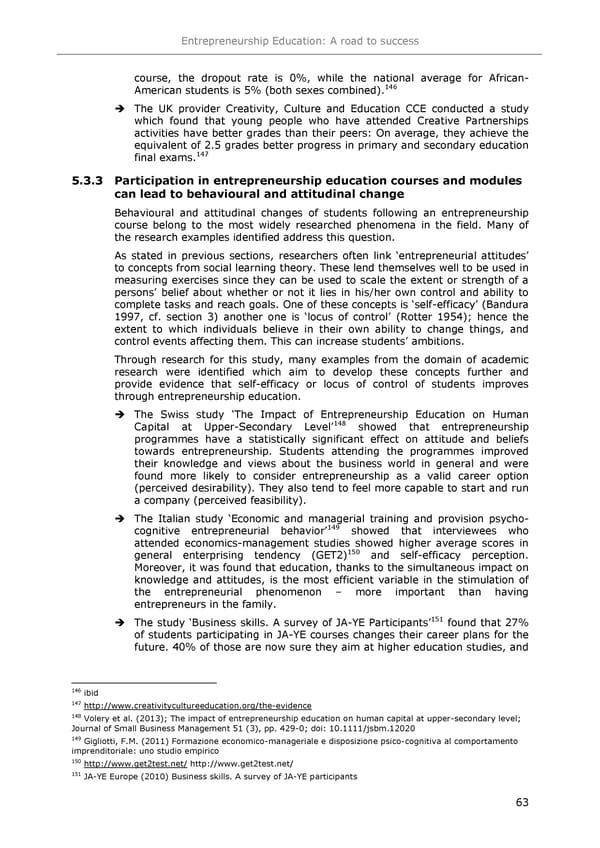Entrepreneurship Education: A road to success course, the dropout rate is 0%, while the national average for African- 146 American students is 5% (both sexes combined). The UK provider Creativity, Culture and Education CCE conducted a study which found that young people who have attended Creative Partnerships activities have better grades than their peers: On average, they achieve the equivalent of 2.5 grades better progress in primary and secondary education 147 final exams. 5.3.3 Participation in entrepreneurship education courses and modules can lead to behavioural and attitudinal change Behavioural and attitudinal changes of students following an entrepreneurship course belong to the most widely researched phenomena in the field. Many of the research examples identified address this question. As stated in previous sections, researchers often link 8entrepreneurial attitudes9 to concepts from social learning theory. These lend themselves well to be used in measuring exercises since they can be used to scale the extent or strength of a persons9 belief about whether or not it lies in his/her own control and ability to complete tasks and reach goals. One of these concepts is 8self-efficacy9 (Bandura 1997, cf. section 3) another one is 8locus of control9 (Rotter 1954); hence the extent to which individuals believe in their own ability to change things, and control events affecting them. This can increase students9 ambitions. Through research for this study, many examples from the domain of academic research were identified which aim to develop these concepts further and provide evidence that self-efficacy or locus of control of students improves through entrepreneurship education. The Swiss study 8The Impact of Entrepreneurship Education on Human Capital at Upper-Secondary Level9148 showed that entrepreneurship programmes have a statistically significant effect on attitude and beliefs towards entrepreneurship. Students attending the programmes improved their knowledge and views about the business world in general and were found more likely to consider entrepreneurship as a valid career option (perceived desirability). They also tend to feel more capable to start and run a company (perceived feasibility). The Italian study 8Economic and managerial training and provision psycho- 149 cognitive entrepreneurial behavior9 showed that interviewees who attended economics-management studies showed higher average scores in 150 general enterprising tendency (GET2) and self-efficacy perception. Moreover, it was found that education, thanks to the simultaneous impact on knowledge and attitudes, is the most efficient variable in the stimulation of the entrepreneurial phenomenon 3 more important than having entrepreneurs in the family. 151 The study 8Business skills. A survey of JA-YE Participants9 found that 27% of students participating in JA-YE courses changes their career plans for the future. 40% of those are now sure they aim at higher education studies, and 146 ibid 147 http://www.creativitycultureeducation.org/the-evidence 148 Volery et al. (2013); The impact of entrepreneurship education on human capital at upper-secondary level; Journal of Small Business Management 51 (3), pp. 429-0; doi: 10.1111/jsbm.12020 149 Gigliotti, F.M. (2011) Formazione economico-manageriale e disposizione psico-cognitiva al comportamento imprenditoriale: uno studio empirico 150 http://www.get2test.net/ http://www.get2test.net/ 151 JA-YE Europe (2010) Business skills. A survey of JA-YE participants 63
 Entrepreneurship Education Page 66 Page 68
Entrepreneurship Education Page 66 Page 68